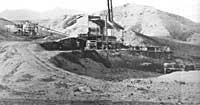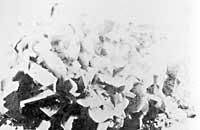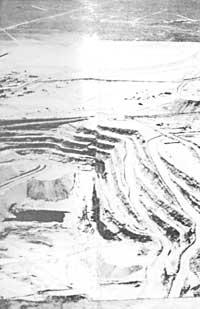Borax by the mind

Harmony.
Since ancient times, borax has been used in technology. The Babylonians already used borax as a foundation in the welding of gold. It is almost certain that egypti used borax as an additive in embalming. In China borax varnishes were known and applied in ceramic manufacture to achieve spectacular reflections.
The Arabs knew the borax 2000 ago and knew it as baurach.
In Europe we met borax much later. The Venetian Marco Polo brings the first gunpowder crystals from Mongolia. The Venetian goldsmiths began to use the Borax as the ancient babylons and soon became a common commercial issue on the caravan tracks.
However, the borax was an unknown substance and of reduced use. Until the 20th century California deposits were discovered. Scarcity was the main cause of these two phenomena. Tibet and XVII. Since the nineteenth century, Tuscany and Chile, the deposits did not produce large quantities. That is why the borax was scarce and expensive.
Borax from California
The spread of the use of Borax is intimately related to the California Death Valley. The enormous pits of borax that were discovered in the same environment of 1881 promoted the diffusion of the product.
That year T. A California business explorer, Coleman, taught a gold miner named Aaron Winters how to detect borax. Winters and his wife Rosie had a gold mining concession around the Death Valley. Winters knew the Valley perfectly and the beautiful white crystals that could be found there almost anywhere were impressed. As Coleman's explorer has shown, by burning the crystals with sulfuric acid and alcohol, bright green flames were extracted. The mind of the borax began.
Valley of Death

This valley, which has played a very important role in the history of the Borax, deserves to be analyzed, not only for that, but also for its peculiar way of being.
This northern California valley is very well named. It is the driest and hottest place in America. The years in which drops have not even fallen are surprising. And when he is there is no fear of drowning. In addition, this valley, long (225 km) and narrow (8-24 km), can be considered in summer as a branch of hell.
The temperature often reaches 49ºC and the highest temperature measured to date was 57ºC in 1913. Logically, the soil temperature under the sun exceeds the ambient temperature and has been measured 88°C. It is not surprising that in the toponymy we find terms like Furnace creek.
The vegetation collected in the Death Valley is scarce and adapted to such harsh conditions as the mosque, creosote shrub and cactus. With the spring rains the Death Valley rejoices some flowers of desert plants. Animals abound and adapt to the nightlife: rabbits, squirrel antelopes, kangaroo rats, coyotes, etc.
The Death Valley is the result of a geological process that ended 200 million years ago. It consists of sedimentary stones of marine origin. The borax and other compounds that can be found in it began to precipitate when this marine branch dried up. So the borax comes from the salts dissolved in that sea. In addition, its origin in the drying of a sea has brought another remarkable curiosity to the Death Valley: Be the lowest dry point in America. It is 86 meters below sea level at the lowest point.
Explosion of the borax
To make known the Death Valley we have ruled out the problems of Aaron Winters. When our friend discovered that the white crystals of the valley were borax, he went to Coleman and sold him the concession. This is how Coleman's Bourbon empire was born, which in the years would be the company called US Borax, which controls most of the world's borax production.

The demand for borax soared. As a result, Coleman suffered a serious problem. It had mineral in the Death Valley (apparent unlimited), which had to transport along 250 km of the desert to the nearest train and be able to market it. It was not a joke problem!
The solution was the use of controls and cars. They designed special strong trolleys to transport the borax. The front wheels were smaller than the rear wheels and all had steel axles. The cart box had a length of 4.25 m, a width of 1.30 m and a depth of 2 m. The empty cart weighed 3,400 kg and filled with 12,000 kg. To transport as many minerals as possible, two consecutive carts were placed to which a cistern that transported 4,500 liters of water was attached. To pull all this a group of 10 pairs of commands was used.
For six years, between 1883 and 1889, transported in this way 10 million kilos of borax were removed from the Valley. Overcoming the heat, winds and lightning storms, men and commanders did a great job.
Over time, the image formed by handles and trolleys has become an extended symbol all over the world.
Today, those mythical times of mandas and menturists are far away, and the Borax industry focuses on the paths of classic and advanced mining.
Use of borax
As mentioned earlier, the borax, or more specifically the boros and their compounds that can be obtained by the borax, has a wide use. However, the largest field of application of borax derivatives is in the fiberglass industry. The detergents and soaps industry is also widely used.

It is used as an auxiliary element in the formulation of detergents, on the one hand because it acts as a buffer product neutralizing bases and acids and on the other reduces the surface tension of liquids. Moreover, boric acid is obtained by borax. It has been widely used (do you have?) in the conservation of shellfish, which maintain their redness, until their toxicity has been proven. Finally, borax is also used in the ceramics industry, in the manufacture of organic matter, in the manufacture of cosmetic products, etc.
We could talk a lot about Borax, but for the work not to be too long, today we conclude.





